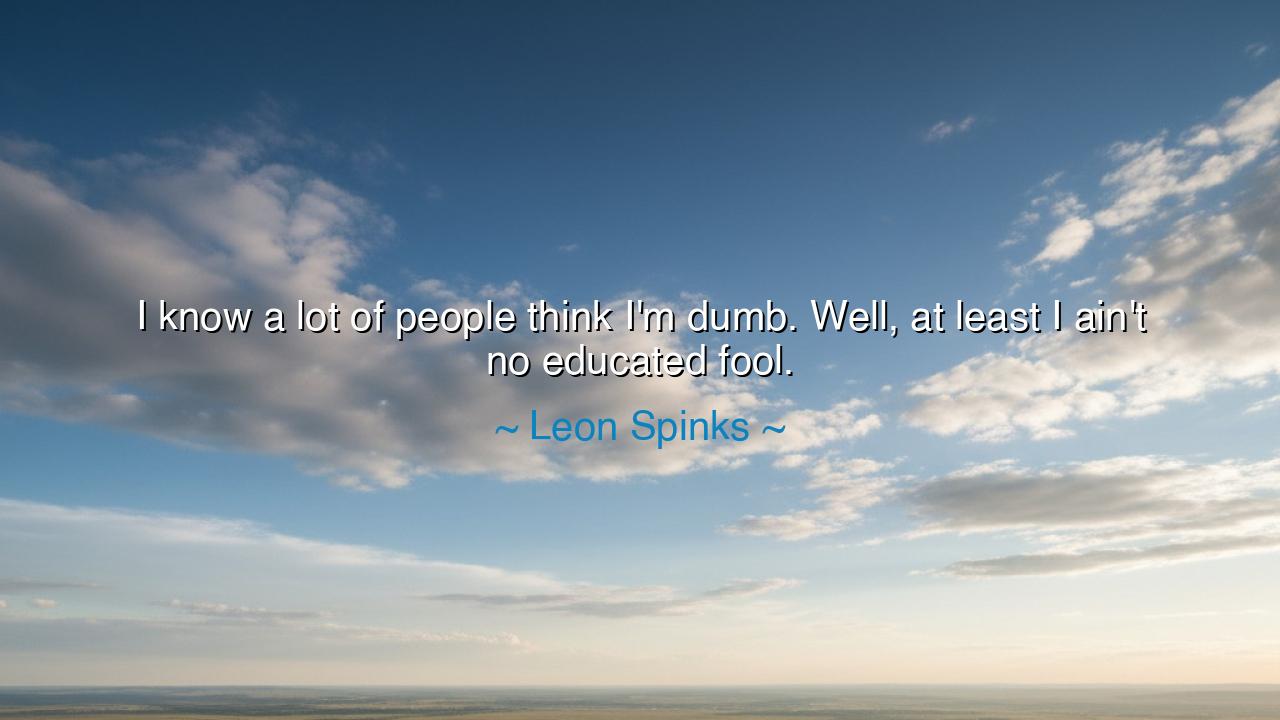
I know a lot of people think I'm dumb. Well, at least I ain't no






Hear the words of Leon Spinks, once a warrior of the boxing ring, who declared with unshaken pride: “I know a lot of people think I’m dumb. Well, at least I ain’t no educated fool.” In this statement, we find not mere defiance, but the cry of a soul that knows its worth, even when the world scoffs. His words remind us that true wisdom does not always wear the robes of scholars, nor is it bound within the walls of schools. For many have been schooled in books, yet blind to truth; and many have been scorned as simple, yet carry within them the fire of insight that no lecture can bestow.
To be thought dumb is the fate of many who walk paths unblessed by the formal titles of society. But Spinks turns this insult upon its head. Better, he says, to be underestimated and still stand true, than to be an educated fool, who with degrees and honors struts proudly, yet lacks humility, sense, or the courage to live rightly. The ancients themselves proclaimed this. Socrates, the wisest of Athens, declared that he knew nothing, and in that confession, he proved wiser than those who thought themselves learned. Thus, wisdom does not rest in knowledge alone, but in understanding, in character, in knowing what is true and what is vain.
Consider the story of Diogenes the Cynic, a man mocked and dismissed as ragged and mad. He had no fine robes, no lofty seat in council, yet he was unafraid to speak truth to Alexander the Great, commanding even a king to step aside and let him stand in the sun. Was he uneducated by the world’s measures? Yes. But was he a fool? No—for he lived with clarity, free of the chains that bound so-called educated men to hollow pursuits. In this way, Spinks walks in the shadow of the ancients, claiming dignity not from appearance, but from the authenticity of spirit.
The quote’s origin lies in Spinks’ own life, forged not in classrooms but in the brutal poetry of the boxing ring. Rising from hardship, he became Olympic champion and then, against all odds, heavyweight champion of the world. His speech, unpolished and raw, invited mockery from those who measured intelligence by eloquence. Yet his triumph proved that wisdom wears many forms: persistence, courage, and the will to seize opportunity. He stood bloodied but unbowed, a testament that intellect is not always the highest currency; sometimes it is grit, sometimes it is resilience, sometimes it is heart.
The meaning is clear: society often confuses education with wisdom, and intelligence with worth. But the two are not the same. A man or woman may possess libraries of knowledge and yet be blind to compassion, blind to humility, blind to truth. This is the educated fool of which Spinks speaks—the one who knows much but understands little. On the other hand, one mocked as “dumb” may live with courage, loyalty, and authenticity, and by these virtues prove far wiser than the scholar.
What lesson, then, must we take? Judge not yourself by the scorn of others, nor measure your value by society’s narrow tools. Instead, seek to live with clarity of purpose and integrity of heart. Education is a gift, yes, but without wisdom it is an empty shell. And wisdom, when joined with humility, shines brighter than any diploma. Therefore, let each person strive not to appear clever, but to live rightly, to speak truth, to act with courage.
Practical actions flow easily from this teaching: do not fear being underestimated, but use it as fuel. If you lack formal schooling, embrace learning in life’s wider classroom—through experience, through failure, through resilience. And if you have education, guard yourself from arrogance; remember that titles and honors mean nothing if you lose sight of humility. In every choice, ask not, How will I appear? but rather, What is right, what is true? In this way, you will not fall into the trap of the educated fool, but walk the steadier path of lived wisdom.
So let this teaching be passed on: wisdom is not confined to books, nor folly limited to the unlearned. The true fool is the one who mistakes knowledge for wisdom, and pride for strength. The true sage is the one who, mocked though he may be, remains steadfast, authentic, and unafraid to stand in his own truth. Such was Spinks’ defiance. And such may it be for us, if we dare to live with the strength of spirit that outshines the judgments of the world.






AAdministratorAdministrator
Welcome, honored guests. Please leave a comment, we will respond soon